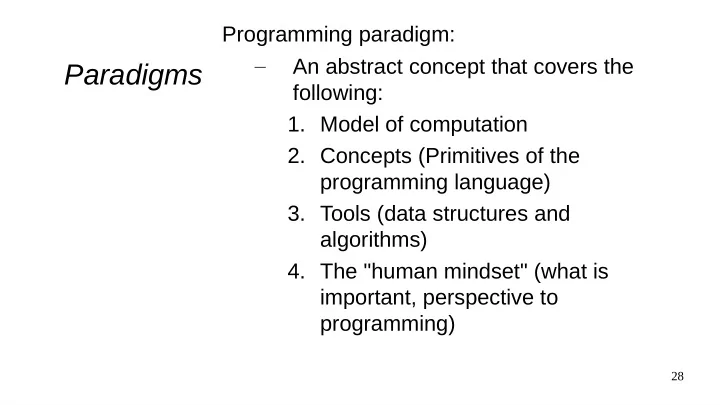

Programming paradigm: – An abstract concept that covers the Paradigms following: 1. Model of computation 2. Concepts (Primitives of the programming language) 3. Tools (data structures and algorithms) 4. The "human mindset" (what is important, perspective to programming) 28
Paradigms Division 1: Division 2: ● Imperative (two ways ● Imperative (procedural) – procedural ● Object oriented of – object oriented ● Functional classifying) – distributed (parallel) ● Logical ● Declarative ● Generative – functiona ● Script – logical – data base languages ● Model of programming – sequential – parallel 29
● Imperative/procedural paradigm ● destructive assignment, explicit control structures, e.g. C, Ada Examples ● Object oriented paradigm (object languages) of ● objects, creating objects, message passing, paradigms inheritance, e.g. Java, (C++) ● Functional paradigm (functional languages) ● immutable variables, no side-effects, e.g. Haskell, Scala, Clojure ● Logic paradigm ● Facts & rules, automatic deduction of results, e.g. Prolog, Curry ● Parallel paradigm ● processes, synchronisation, message passing, e.g. Go, Erlang 30
Why paradigm shift now? 31
● Real CPUs very complex ● Performance difficult to predict Why paradigm ● Concurrency/parallelism complicates shift now? things ● Programming more abstract, detached from hardware ● Compilers need more freedom to optimize code ● → Programmer cannot be in 100% control 32
● Functional and Logic programming ● Problems in imperative programming: Declarative Programming – Implementing algorithms • How to solve a problem • Tied to a specific computational model (abstract view of the real computer) Programmer: what needs • Forces a specific way of thinking to be done • Limiting compiler's/interpreter's Language: how it is done freedom (to optomize) – Problem definition needs its own formalism 33
● Mutual exclusion ● Aliasing Problems with ● Cache/data coherence imperative ● Instruction reordering paradigm ● (Distributed programs and time ordering) 34
● (Based on theory of functions in mathematics) Functional ● Principles Programming – expression (function call) value depends only on the values of subexpressions (arguments) – No side effects – No assignment, immutable data – Functions as "first-class citizens", as data ● Many functional programming languages are ”impure” (contain assignments etc.) – Functional part is however dominating 35
● Declarative "tells" something, imperative "orders" something Imperative ● Declaration: vs. int f(int i) { return 2*i; } declarative ● A sequence of statements (commands): ++i; i = f(i); cout << i; ● Is this a declaration or a statement?: int j = f(i); 36
● Gives more freedom to the compiler (optimization) Benefits of ● Makes data flow in program clearer functional (only parameters & return value) programming ● Make parallelization easier (immutable data & clear data flow -> easier to add concurrency) ● Forces programmer to think more exactly(?) ● Encourages programmers to structure their code better(?) 37
● No side effects, no mutable data ● → sharing data between threads ok Concurrency ● More freedom in execution order ● → automatic parallelization easier ● Synchronization and exchanging information between threads more challenging ● Transactional memory one promising route 38
● Initially "strange" for those used to imperative programming Problems ● Performance sometimes difficult to with predict (exact execution steps not functional clear, especially with laziness) programming ● Interaction with outside world not as simple as in imperative programming 39
● Claims to produce less errors, because forces programmers to think Other claims more about ● Claims to encourage programmers to functional structure their code better programming 40
Recommend
More recommend